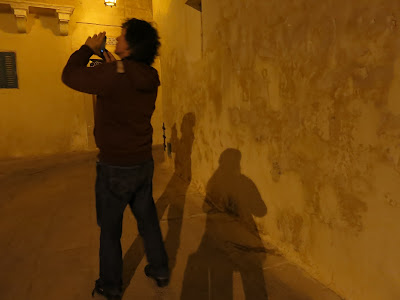We walked into the little hut that is David Hul's Scrimshaw Studio in Julian, Ca. While we were admiring all his decorated skulls and knives and learning about scrimshaw, David said to me, 'You are very colourful!'. I'm not sure it was meant as a compliment, but it made me smile, because the more I travel, the more I tend to accumulate layers of colour, mementos, souvenirs, gifts, in a happy, wild confusion. While I move through space and time, the stationary residents look at me with amusement or, rather, bemusement. When I think of this layering, tattoos of experience and memory, good and bad branding on the skin or the heart or the wrinkles, I think of my long lost copy of Superslave, gone AWOL sometime at the end of the Seventies. I always thought of buying it again, but never did. What I remember of Superslave is that he was going on a lot of adventures. These adventures changed him, his hair was shorter or longer, the clothes different. In most of the adventures Superslave died, and came back to life with a new tattoo that symbolised his new death - if he drowned, he would have a tattoo of waves, etc. He ended up covered in tattoos.
I didn't ask David Hul what tattoos he might have accumulated in his life as a California scrimshaw artist, but his studio was layered with so many things, bones, pictures, books. I could have spent hours in there, but I didn't. I guess I thought I could just 'look him up later', but David is an off the grid type of guy, so I lost a great opportunity for learning. Perhaps because I was momentarily blinded by protagonism, I forgot how to be an explorer and discover more. All I could find online later was this amazing picture of him in his studio.










